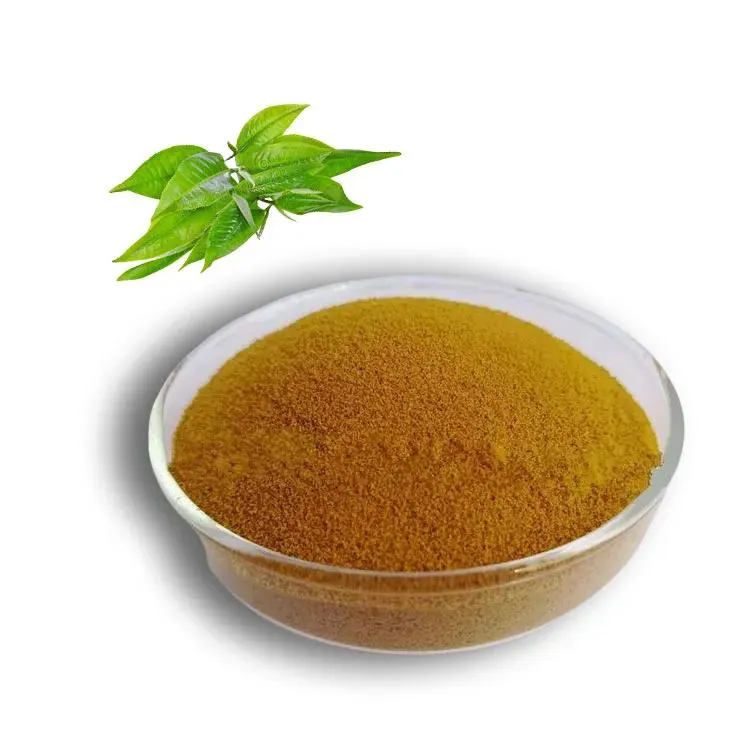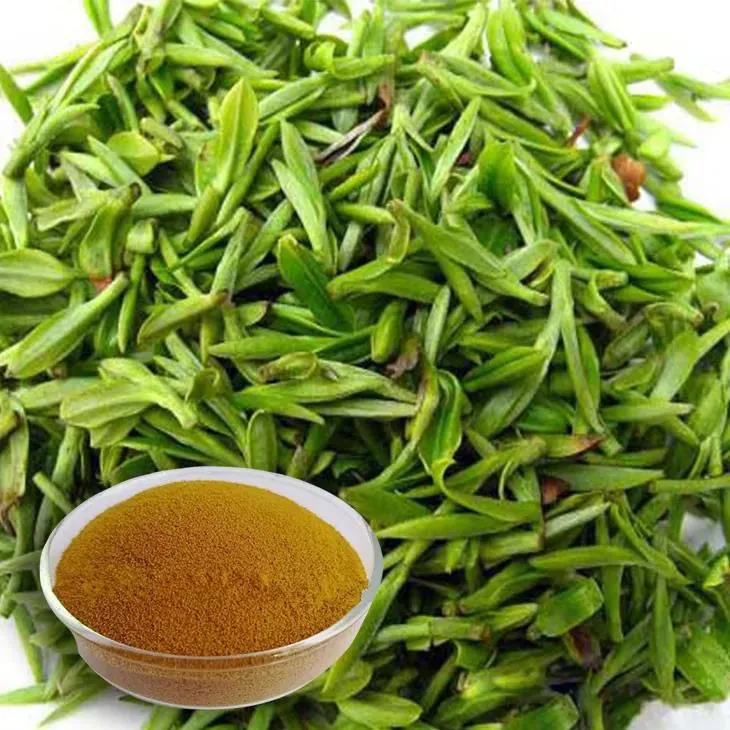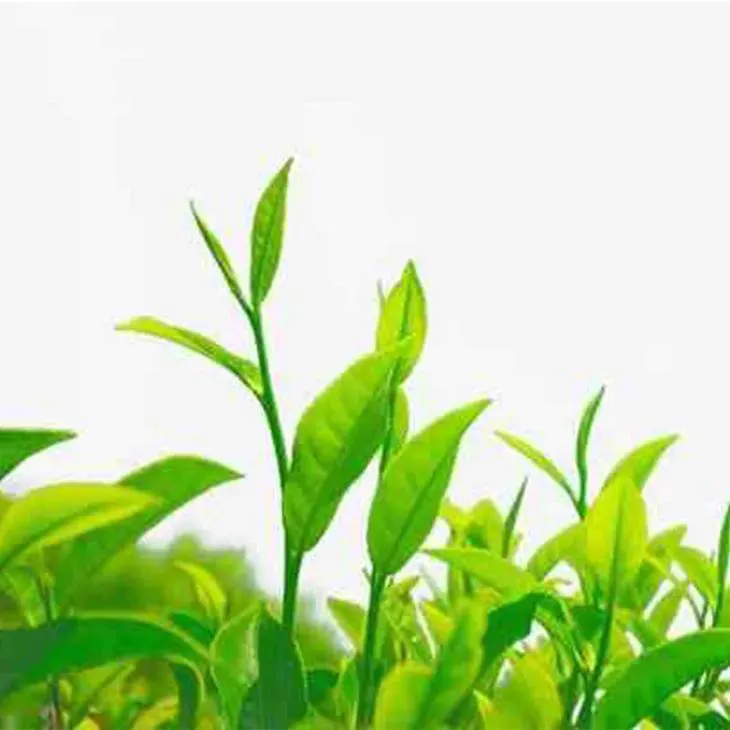- 0086-571-85302990
- sales@greenskybio.com
Best Answers to 7 Key Questions about Green Tea Extract.
2024-12-14

1. What is Green Tea Extract?
Green Tea Extract is a concentrated form of green tea. It is obtained through a process that involves extracting the active components from green tea leaves. Green tea itself is made from the leaves of the Camellia sinensis plant. The extract contains various bioactive compounds, such as catechins, which are a type of antioxidant. These catechins, especially epigallocatechin - 3 - gallate (EGCG), are believed to be responsible for many of the health - promoting properties associated with green tea extract.

2. What are the Health Benefits of Green Tea Extract?
Antioxidant Activity
- Green tea extract is rich in antioxidants, which help to combat oxidative stress in the body. Oxidative stress is linked to various diseases, including heart disease, cancer, and neurodegenerative disorders. The antioxidants in the extract can neutralize free radicals, which are unstable molecules that can damage cells.
- Some studies suggest that green tea extract may aid in weight loss. It may increase metabolism and fat oxidation. EGCG has been shown to affect the way the body processes fat, potentially leading to a reduction in body fat percentage.
- It can have a positive impact on heart health. It may help to lower blood pressure, reduce cholesterol levels, and improve blood vessel function. By reducing inflammation in the blood vessels and improving lipid profiles, it can contribute to a lower risk of heart disease.

3. How is Green Tea Extract Produced?
Harvesting of Green Tea Leaves
- The process begins with the careful harvesting of green tea leaves. The quality of the leaves is crucial, and they are typically picked at a specific time to ensure optimal levels of active compounds. Young leaves are often preferred as they tend to have higher concentrations of catechins.
- There are different methods of extraction. One common method is solvent extraction, where solvents such as ethanol or water are used to extract the active components from the leaves. Another method is supercritical fluid extraction, which uses supercritical carbon dioxide. This method is often preferred as it can produce a high - quality extract without leaving behind harmful residues.
- After extraction, the extract may undergo purification steps to remove impurities. It is then concentrated to increase the concentration of the active compounds. This results in a more potent green tea extract that can be used in various applications.

4. What are the Applications of Green Tea Extract?
Food and Beverage Industry
- Green tea extract is widely used in the food and beverage industry. It can be added to various products such as green tea - flavored drinks, ice creams, and confectionery items. It not only provides a unique flavor but also adds the health - promoting properties of green tea.
- In the cosmetics and skincare industry, green tea extract is a popular ingredient. It is known for its antioxidant and anti - inflammatory properties. It can be found in products such as face creams, serums, and sunscreens. It helps to protect the skin from damage caused by free radicals and can also soothe irritated skin.
- Green tea extract has potential pharmaceutical and nutraceutical applications. It is being studied for its role in preventing and treating various diseases, such as cancer and diabetes. Some dietary supplements contain green tea extract as a key ingredient, aiming to provide the health benefits associated with it.
5. Are There Any Side Effects of Green Tea Extract?
Digestive Issues
- Some people may experience digestive side effects when taking green tea extract. This can include nausea, stomach upset, and diarrhea. These side effects are usually mild and may occur more frequently when high doses are consumed.
- Green tea contains caffeine, and so does its extract. High - dose consumption of green tea extract may lead to caffeine - related side effects such as insomnia, jitters, and increased heart rate. People who are sensitive to caffeine should be cautious when using green tea extract.
- Green tea extract may interact with certain medications. For example, it can interact with blood - thinning medications, potentially increasing the risk of bleeding. It is important to consult a healthcare provider before using green tea extract if you are taking any medications.
6. How Should Green Tea Extract be Consumed?
Dosage
- The appropriate dosage of green tea extract can vary depending on the intended use and individual factors. In general, for health - promoting purposes, a daily dose of 200 - 300 mg of catechins (equivalent to about 3 - 5 cups of green tea) is often recommended. However, for more specific applications such as weight loss, higher doses may be used under the guidance of a healthcare professional.
- Green tea extract can be consumed in various forms. It is available as capsules, tablets, powders, and liquid extracts. Capsules and tablets are convenient for those who prefer a simple and easy - to - take form. Powders can be added to drinks or smoothies, while liquid extracts can be taken directly or added to beverages.
- There is no strict rule regarding the timing of green tea extract consumption. However, if you are sensitive to caffeine, it may be advisable to avoid taking it close to bedtime to prevent insomnia. Also, taking it with food may help to reduce the risk of digestive side effects.
7. How to Ensure the Quality of Green Tea Extract?
Source of Green Tea Leaves
- The quality of the green tea leaves used in the extract is fundamental. High - quality leaves from reliable sources are more likely to produce a high - quality extract. Look for extracts sourced from organically grown tea plants, as they are less likely to contain pesticides and other contaminants.
- Choose products that are manufactured in facilities that adhere to good manufacturing practices (GMP). GMP - compliant facilities ensure that the extraction, purification, and packaging processes are carried out in a clean, controlled, and standardized manner, reducing the risk of contamination and ensuring product consistency.
- Look for products that have been tested for purity and potency. Third - party testing and certification can provide additional assurance of quality. For example, products that are certified organic or have passed quality control tests for heavy metals and other contaminants are more likely to be of high quality.
FAQ:
Question 1: What are the main active components in green tea extract?
Green tea extract contains several important active components. One of the most notable is catechins, especially epigallocatechin - 3 - gallate (EGCG). EGCG is a powerful antioxidant that has been studied for its potential health benefits. Additionally, it also contains caffeine, which can have a stimulating effect on the body. Flavonoids and polyphenols are also present in green tea extract, contributing to its antioxidant and anti - inflammatory properties.
Question 2: What are the potential health benefits of green tea extract?
Green tea extract has been associated with numerous potential health benefits. Antioxidant - wise, its components can help combat oxidative stress in the body, potentially reducing the risk of chronic diseases such as heart disease and certain cancers. It may also have a positive impact on metabolism, potentially aiding in weight management by increasing fat oxidation. Some studies suggest that it can improve cognitive function and help protect the brain from age - related decline. Additionally, its anti - inflammatory properties may be beneficial for various inflammatory conditions.
Question 3: How is green tea extract used in the cosmetic industry?
Green tea extract is widely used in the cosmetic industry. Due to its antioxidant properties, it is often added to skincare products such as creams, lotions, and serums. It can help protect the skin from damage caused by free radicals, which are associated with premature aging, such as wrinkles and loss of elasticity. Green tea extract may also have anti - inflammatory effects on the skin, making it useful for treating skin conditions like acne and rosacea. It can be used in haircare products as well, potentially promoting a healthy scalp and shiny hair.
Question 4: Are there any side effects of green tea extract?
While green tea extract is generally considered safe for most people, there can be some side effects. High doses of green tea extract, especially those containing a large amount of caffeine, may cause insomnia, nervousness, and an increased heart rate. It may also interact with certain medications. For example, it can interfere with the absorption of some drugs. People with certain medical conditions, such as anemia or liver disease, should consult a doctor before taking green tea extract supplements.
Question 5: How is green tea extract produced?
The production of green tea extract typically starts with the leaves of the Camellia sinensis plant. First, the fresh tea leaves are harvested. Then, they are steamed or pan - fried to prevent oxidation, which is a key step in maintaining the beneficial components. After that, the leaves are dried and ground into a fine powder. To obtain the extract, solvents such as water or ethanol are used to dissolve the active components from the powder. The resulting liquid is then further processed to concentrate the extract and remove any impurities.
Question 6: Can green tea extract be used for weight loss?
Green tea extract has been studied for its potential role in weight loss. Some research suggests that its catechins, particularly EGCG, may increase thermogenesis (the body's heat production) and fat oxidation. However, it is not a magic solution for weight loss. For effective weight loss, it should be combined with a healthy diet and regular exercise. Also, the effects may vary from person to person depending on factors such as individual metabolism and lifestyle.
Related literature
- Green Tea Extract: Chemistry, Antioxidant Properties and Applications"
- "The Health Benefits of Green Tea Extract: A Review of the Current Literature"
- "Green Tea Extract in Cosmetics: Properties and Efficacy"
- ▶ Hesperidin
- ▶ Citrus Bioflavonoids
- ▶ Plant Extract
- ▶ lycopene
- ▶ Diosmin
- ▶ Grape seed extract
- ▶ Sea buckthorn Juice Powder
- ▶ Fruit Juice Powder
- ▶ Hops Extract
- ▶ Artichoke Extract
- ▶ Mushroom extract
- ▶ Astaxanthin
- ▶ Green Tea Extract
- ▶ Curcumin
- ▶ Horse Chestnut Extract
- ▶ Other Product
- ▶ Boswellia Serrata Extract
- ▶ Resveratrol
- ▶ Marigold Extract
- ▶ Grape Leaf Extract
- ▶ New Product
- ▶ Aminolevulinic acid
- ▶ Cranberry Extract
- ▶ Red Yeast Rice
- ▶ Red Wine Extract
-
Saponin Extract
2024-12-14
-
Bilberry Extract
2024-12-14
-
Green Tea Extract
2024-12-14
-
Sophora Japonica Flower Extract
2024-12-14
-
Beetroot juice Powder
2024-12-14
-
Phellodendron Extract
2024-12-14
-
Maca Extract
2024-12-14
-
Quercetin
2024-12-14
-
Curcumin
2024-12-14
-
Citrus bioflavonoids
2024-12-14




















